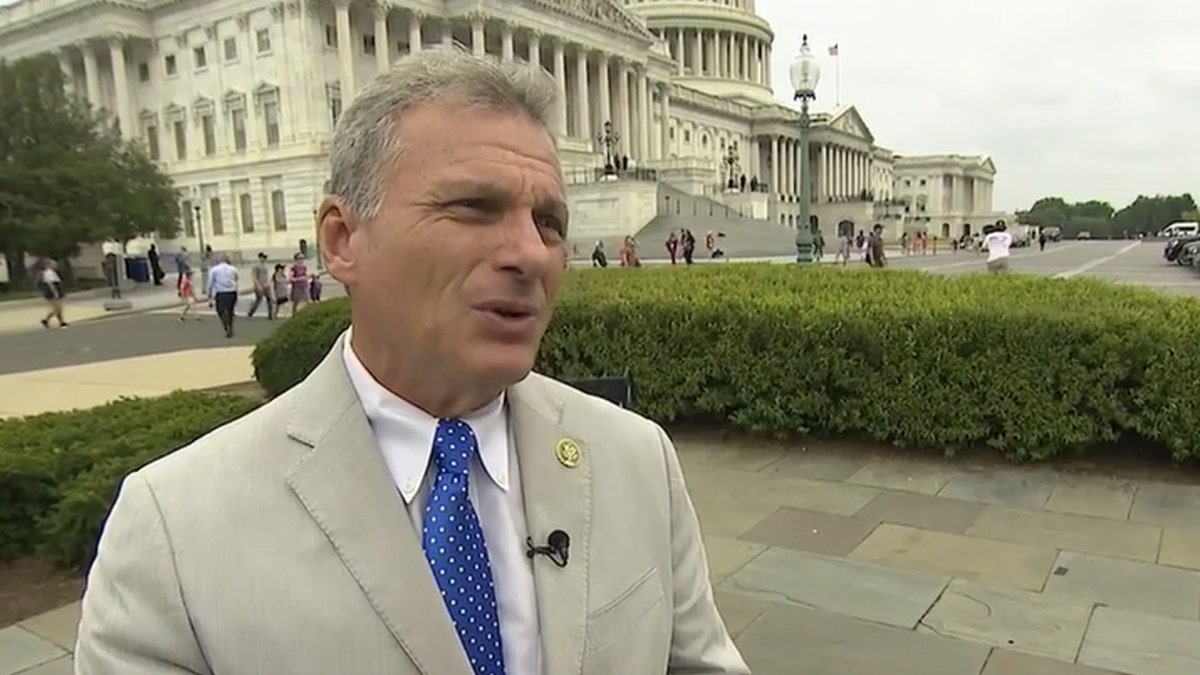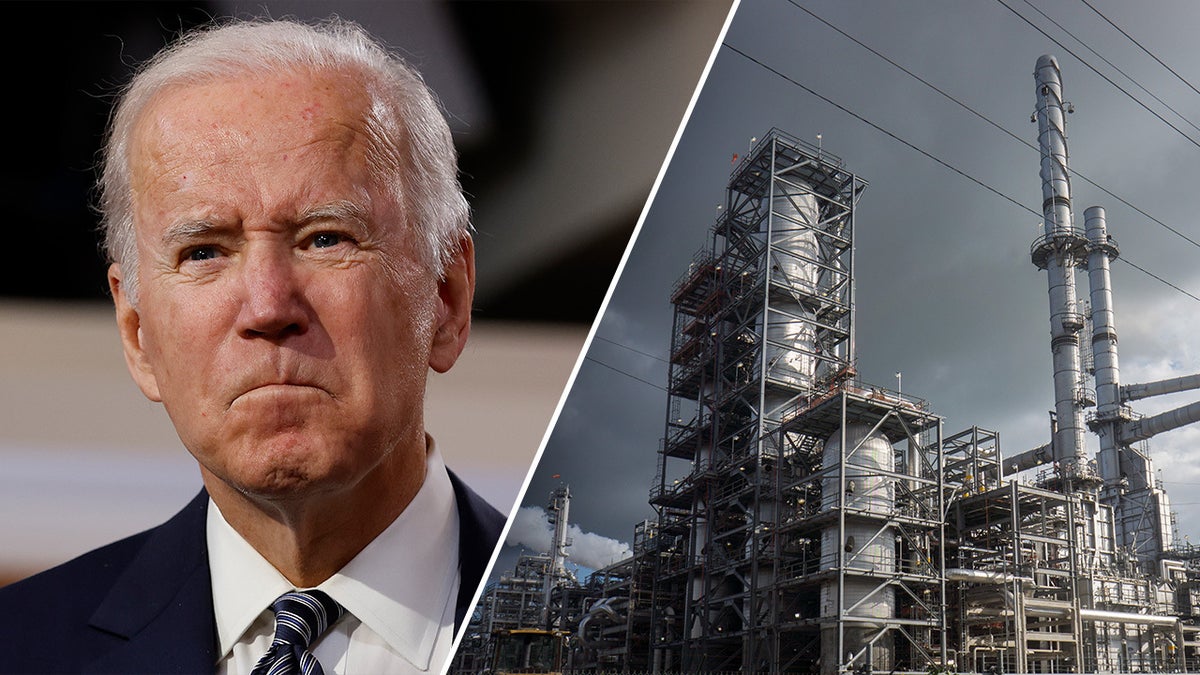Biden admin's EV push is part of a 'larger grand scale' policy of the climate change agenda: Maria Bartiromo
'Sunday Morning Futures' anchor Maria Bartiromo reacts to former President Trump's slam on Biden's EV push and what Democrats see as the 'existential threat' to the country.
FIRST ON FOX: House Republicans are introducing legislation Friday that would reverse the Biden administration's recently-finalized climate regulations targeting the U.S. manufacturing sector.
Rep. Buddy Carter, R-Ga., who chairs the House Energy and Commerce Committee's Environment, Manufacturing, and Critical Materials Subcommittee, is introducing the Air Quality Standards Implementation Act alongside 14 fellow GOP lawmakers. The legislation, crafted in response to the Environmental Protection Agency's (EPA) recent air quality regulations, seeks to reform the process for pursuing such environmental rules.
"Let's make sure we understand and set the groundwork that the Clean Air Act was not established to kill American productivity and prosperity," Carter told Fox News Digital in an interview. "That's not why we we have the Clean Air Act. It was instead — the reason for it was to help enhance our success."
"The Biden administration didn't need to do this, but they have tried to update the next national ambient air quality standards," he continued. "If they go through with what they're trying to go through with, then it's going to slam the brakes on any economic prosperity we may enjoy in this country."
FEDERAL COURT JAMS BRAKES ON BIDEN ADMIN'S EFFORT TO SHUT DOWN MAJOR PETROCHEMICAL PLANT

Rep. Buddy Carter, R-Ga., told Fox News Digital his bill would forward a "practical, common sense approach" to air quality regulations. (Fox News)
Carter added that his legislation is a "practical, common sense approach" to air quality regulations.
In particular, the Air Quality Standards Implementation Act would require EPA to follow a predictable timeline of review for its so-called National Ambient Air Quality Standards (NAAQS) program. It would give states increased powers in the NAAQS process and ensure certain actions like wildfire mitigation, which generates soot, are not punished under the program.
TOP HOUSE COMMITTEE PROBES JOHN KERRY'S COORDINATION WITH ECO GROUPS PUSHING COAL POWER SHUTDOWN
Carter's legislation comes one month after EPA finalized the latest NAAQS standards in a joint announcement with environmental activists, saying that limiting particulate matter known as PM2.5, or soot, would have health benefits for Americans nationwide. The rulemaking lowers the annual federal PM2.5 standard from a level of 12 micrograms per cubic meter to a level of 9 micrograms per cubic meter.
According to EPA, the regulations will prevent up to 4,500 premature deaths and 290,000 lost workdays while yielding up to $46 billion in net health benefits by 2032. Additionally, the agency noted that as PM2.5 concentrations have decreased 42% since 2000, the U.S. gross domestic product has increased 52%.

Environmental Protection Agency Administrator Michael Regan speaks at the White House on Nov. 27, 2023. (AP Photo/Andrew Harnik, File)
However, the regulations were immediately criticized by business groups, industry associations and Republican lawmakers, who said the regulations would substantially harm manufacturers and the economy broadly.
WHITE HOUSE INTERVENED TO GRANT 'QUASI-REGULATORY AUTHORITY' TO FOREIGN GREEN GROUPS
Opponents pointed to a May 2023 study conducted by Oxford Economics and commissioned by the National Association of Manufacturers that concluded more restrictive PM2.5 regulations would threaten between $162.4 and $197.4 billion of economic activity while putting 852,100 to 973,900 current jobs at risk.
"The Biden Administration’s irresponsible rule on fine particulate matter harms rural producers in every industry," Rep. Dan Newhouse, R-Wash., who chairs the Congressional Western Caucus, said Friday. "This bill takes important steps to empower states to implement standards, rather than giving unelected bureaucrats in Washington, DC, even more power to control our lives."

Manufacturers warned the Biden administration's air quality regulations would threaten nearly a million jobs nationwide. (Getty Images)
"I am proud to join Rep. Carter in pushing back against EPA's overreaching attempt to hamper American energy and hamstring the manufacturing sector," added Rep. Bob Latta, R-Ohio. "As Ohio’s Fifth District is home to more than 86,000 manufacturing jobs, this proposed rule will have a severe impact on our local economy. EPA continues to cast uncertainty over the energy and manufacturing industry, chilling investment in American companies to the benefit of our foreign competitors."
The regulations, meanwhile, will make the U.S. PM2.5 standards among the world's most burdensome. While Australia and Canada have annual standards lower than 9 micrograms per cubic meter, Japan has a standard of 15 micrograms per cubic meter, and the U.K. and European Union both have a standard of 20 micrograms per cubic meter.
CLICK HERE TO GET THE FOX NEWS APP
China and India have annual standards of 35 micrograms per cubic meter or greater.
Additionally, on Thursday, Senate Republican Leader Mitch McConnell, R-Ky., introduced a resolution alongside 45 fellow Senate Republicans that would strike down EPA's NAAQS regulations.
"Senate Republicans will continue to stand with American workers and job creators – especially when the Biden Administration tries to make their work harder," McConnell said Thursday.














































